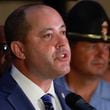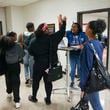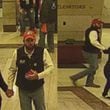5 ways students cheat on online exams:
These are the most frequent methods detected by Examity, a company offering live online proctoring services to clients including UGA and Georgia State University
1. Cheat sheets
2. Google search/Translate
3. Copying test questions for distribution
4. Flash cards hidden beneath keyboard
5. Answers hung on walls
Ernie Lee, like many teachers, tries to stay one step ahead of his students around test time.
Once, he created four versions of an exam to prevent students from cheating. One student, upon receiving his exam, told Lee he had the wrong test. “Students are ingenious,” said Lee, Georgia’s public school teacher of the year. “They’ll snap (a picture of the test) and email it and text it to their buddies.”
It’s a desperate time of the year for some Georgia students. As they take the Georgia Milestones, which began this week, or prepare for final exams, some students will try to cheat their way to top grades or simply passing.
Data suggest cheating is increasing.
State records show the number of public school students disciplined for academic dishonesty, which includes cheating, rose about 3.5 percent from 4,285 in the 2012-13 school year to 4,434 in 2014-15.
The state's University System does not compile such data for its 29 public colleges and universities. Schools such as the University of Georgia maintain their own data. Over the past three fall and spring semesters of the academic years, 2,030 UGA students have been reported for academic dishonesty, with the largest number — 988 — in 2012-2013. The number dropped almost 53 percent the following year, but rose almost 24 percent for 2014-15.
Most cheating involves unauthorized assistance or plagiarism, and with the advent of more tests administered online, the ways students cheat have gotten more creative.
For example, some extreme cheating cases recorded by Examity, a company offering live online proctoring services, include:
• a student’s mother hid under a desk and tried to communicate answers;
• one test-taker faked a coughing fit to free a cheat sheet in the back of his throat;
• in a third case, someone stood outside the room and tried to cough Morse code answers to a test-taker.
The company, whose clients include UGA and Georgia State University, reviewed more 62,500 online final exams it proctored last fall, and found that 6 percent of students still violated the rules even when they were being monitored.
“We believe we are deterring the large majority of people, but can’t say with certainty whether if people knew they weren’t being watched, whether the six percent would increase,” said Michael London, Examity’s CEO. “At a minimum you’re getting the casual cheater to make the appropriate decisions that this is not worth it.” He estimates the number of people cheating on online exams would be closer to 25 percent if they knew they weren’t being watched.
Lee, who teaches at Savannah’s Windsor Forest High, said he warned a class for high-achieving students last year that he would check their work for plagiarism, but five of his 40 students failed to cite where they received some of their information. Some of the guilty students told Lee they didn’t have time to do the work and panicked.
In March, 19 students from Atlanta's Crim High School were suspended on charges they cheated on online courses. They used a staff member's log-on to alter their information in the online course system, officials said. Last year, several Crim teachers complained that some students Googled answers to test questions.
Some experts say high school students are not trained in research, so they lift information and don’t credit the source, and lack of critical thinking skills is another problem.
David Zheng said he used to copy other students’ homework all the time in high school. Now that he’s in college, he doesn’t do it anymore. “It was like cheating myself, because I wasn’t learning,” said the Georgia State University sophomore.
Pressure to succeed is a cause for much of the cheating, some say.
“They’re incredibly stressed out to the max,” said Lee.
Collins Hill High School in Gwinnett County had 133 academic-dishonesty complaints last school year, the most among Georgia schools, state records show. Reillie Murphy, 17, a senior, recalled seeing a classmate caught checking his hidden cellphone for answers during a test. Another student's method was more old-school: He somehow got the exam answers and wrote them on his arm, she said.
Murphy said she’s never felt the urge to cheat. “You can get kicked out of school for that,” she said.
The state education department did not have statistics on how many public school students are expelled for cheating.
At UGA, three students were expelled for academic dishonesty in the 2012-13 and 2013-14 school years. During the past school year, six were expelled. These were repeat offenders, with previous violations on the books. Expulsion is the last resort.
Students must agree to abide by the university's academic honesty policy when applying for admission. A 45-member student council promotes academic honesty and makes presentations to students during orientation sessions. When a violation is reported, UGA holds an hourlong meeting with the professor, student and a third person, who can be a member of the student council. In most cases, the professor and student agree to a punishment and the case is ended. If they can't agree, it moves to another level.
“Our model is for education to be the main goal and for students to learn from the process and move on,” said Deborah Bell, director of Academic Honesty and Student Appeals. During the last school year, only 3 percent of cases moved beyond the initial mediation discussion.
In Gwinnett schools, which recorded about one-quarter of the state’s academic-dishonesty complaints, the discipline is often removing students from some activities. In Henry County, which had no recorded complaints in the past three years, officials say they allow teachers to determine the discipline.
Zheng, the Georgia State student, said he hasn’t cheated in college but he knows of other students who have — or at least tried. They’ve programmed answers or notes into their Apple watches, slipped notes into calculator covers and tried traditional methods like copying other students’ test sheets, he said.
Zheng says many professors combat cheating in traditional ways: requiring students to sit apart from others, handing out different versions of an exam and banning phones and other electronics during test time. Zheng’s calculus professor has even gone as far as having fake students take a test along with actual students and report any cheaters.
Doing that is pretty extreme, he said, shrugging, but it can work.
About the Author






